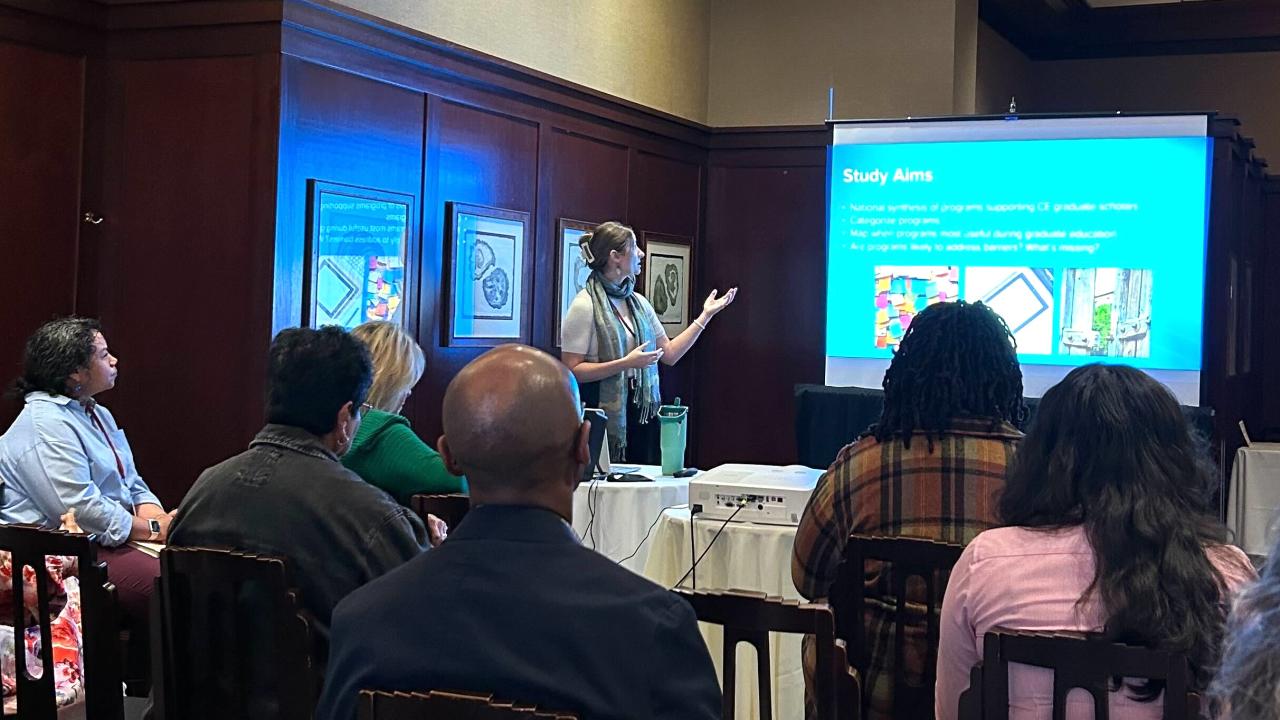
Public Scholarship and Engagement Champions Collective Impact at Conferences
The Office of Public Scholarship and Engagement (PSE) recently shared its current research at two major conferences — the International Association for Research on Service-Learning and Community Engagement (IARSLCE) and the Engagement Scholarship Consortium (ESC) — where the PSE team presented on fostering collective impact, leading institutional transformation and supporting community partnerships.
IARSLCE: Showcasing PSE’s Backbone Role
Applying Collective Impact in Higher Education: A Case Study of UC Davis’ Catalyzing Impact Initiative
Gabriela Kovats Sánchez, postdoctoral scholar; Amy Hart, program manager
Catalyzing Impact is a multi-year process to document and improve the impact of university-community partnerships and public engagement activities across UC Davis. This ongoing case study by Kovats Sánchez and Hart focuses on the critical infrastructure PSE provides to coordinate campus-community collaborations, and strategies to ensure continued success. They discussed a framework to integrate efforts across disciplines and units, enabling coordinated support for faculty, students and community partners. They also described challenges, such as navigating historical power dynamics between campuses and communities to foster genuine, reciprocal relationships.
Strengthening Community Engagement in a Research University: A Collaborative Approach
Stacey Muse, director of engagement; Amy Hart, program manager
In 2023, PSE and the UC Davis Health Office of Health Equity, Diversity and Inclusion held two summits to establish and define core values that will guide a unified vision for community engagement across UC Davis and UC Davis Health. Faculty and staff who attended identified three key themes: 1) prioritize community engagement; 2) improve coordination and assessment; and 3) build partnership capacity. The findings and recommendations were shared through a report that highlighted opportunities for growth and a path forward to strengthen community engagement at UC Davis.
Youth Voice in SLCE: Youth as Experts, Not Recipients in SLCE
Moira Delgado, community partner manager
Youth Voice in Nonformal SLCE Programming
Moira Delgado; Colette Ankenman, doctoral candidate at Saint Mary’s College of California
Delgado showcased research on youth voice in service-learning and community Engagement (SLCE), and how universities can center community perspectives in public scholarship efforts. This study focuses on how youth from marginalized communities experience partnerships with college students in the UC Davis College Corps and how their voices can shape future programming. The speakers included undergraduates from UC Davis and Sacramento State University, who emphasized that youth should be viewed as experts, not merely recipients of service. Delgado also described a youth participatory evaluation (YPE) methodology, where high school students co-designed evaluation tools and provided recommendations for new programs.
ESC: Exploring Collective Impact in Higher Education
Envisioning Collective Impact Approaches in Higher Education
Michael Rios, vice provost; Gabriela Kovats Sánchez, postdoctoral scholar
Collective impact is a framework for achieving large-scale social change by aligning the efforts of multiple stakeholders — across sectors — toward a shared goal. Rios and Kovats Sánchez led a roundtable discussion that explored five critical conditions for success: a common agenda, shared measurement systems, mutually reinforcing activities, continuous communication, and the presence of a centralized backbone unit. During the discussion, Rios and Kovats Sánchez shared how PSE collaborates with over 20 units across UC Davis to create an ecosystem of engagement. The session underscored the value of public scholarship as a driver for long-term community engagement and institutional accountability.
Imagining Change, Changing Cultures: Views from the Field
Michael Rios, vice provost
Rios organized and moderated a panel discussion featuring Elyse Aurbach, University of Michigan director of public engagement and research impacts; Erica Kohl-Arenas, Imagining America faculty director and UC Davis associate professor of American studies; and Burton Bargerstock, Michigan State University director of the office for public engagement and scholarship. They shared stories about personal journeys as faculty change-makers, organizational leaders and institutional brokers who work across sectors and disciplines. This discussion highlighted practical tactics, from building supportive peer networks to reshaping promotion and tenure practices.
Harnessing Collective Impact: Building Community-Informed Metrics in Higher Education
Gabriela Kovats Sánchez, postdoctoral scholar
Kovats Sánchez outlined how PSE is using a collective impact (CI) framework to develop community-informed metrics for public engagement in higher education. Highlighting PSE’s Catalyzing Impact Initiative, Kovats Sánchez discussed how CI principles — such as shared measurement and centralized infrastructure — can help address challenges like fragmented engagement and power imbalances between universities and communities.
Creating Institutional Supports for Epistemic Equity: A Social Ecological Approach to Engaged Scholarship
Larissa Seco, graduate student in sociology
Based on prior research with Vice Provost Michael Rios, Seco illustrated how traditional academic structures often marginalize scholars working on public and community-engaged research, especially those from historically underrepresented groups who are deeply invested in community impact. Key takeaways included the importance of multi-level institutional support that aligns with engaged scholars' motivations, and how social ecology frameworks can guide policy reforms that embed equity into the recognition and reward systems for faculty.
Institutional Analysis of Programs Supporting Community Engaged Graduate Scholars
Meghan Zulian, graduate student in earth and planetary sciences
Zulian explored the importance of institutional support for community engaged graduate scholars. Findings from her national synthesis on community engaged graduate programs emphasize the need to expand support for graduate students, a group often overlooked in community engagement studies compared to their undergraduate peers.
